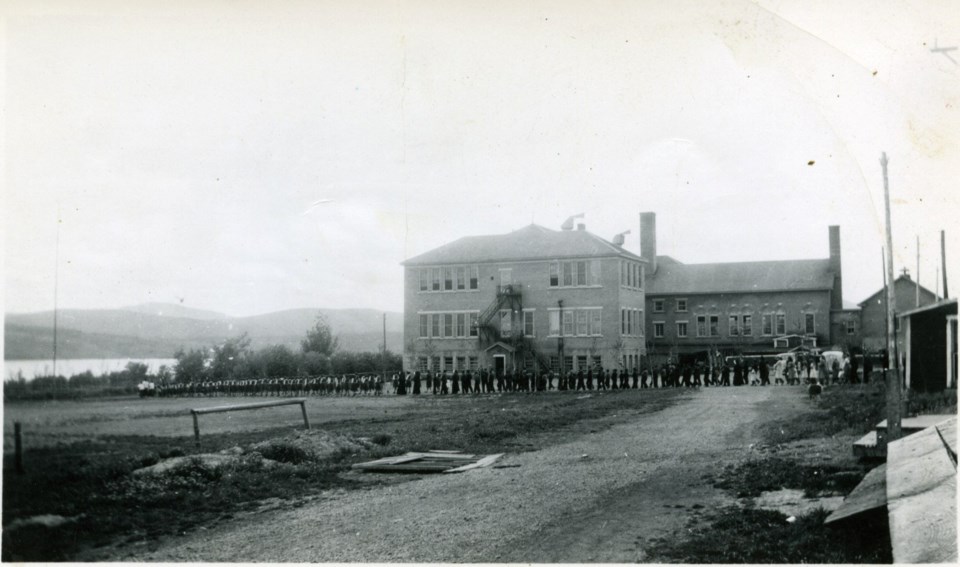The Nations of Nadleh Whut'en and Stellat’en are hosting a three-day healing ceremony at the site of the former Lejac Indian Residential School, 160 kilometers west of Prince George.
The event called, ‘Wiping the Tears Healing Ceremony’ takes place between June 18 to 20 will be supported by Carrier Sekani Family Services (CSFS).
This ceremony is intended to allow people, Indigenous and all cultures, the opportunity to grieve and let go of the pain they may be experiencing as a result of the recent finding of 215 unmarked graves of Indigenous children at the Kamloops Residential School site.
CSFS said plans include a sacred fire ceremony to release the souls of the children to the Creator.
The ceremony will include the presence of Fire Keepers for the duration of three days, as well as opportunities to seek support from traditional healers, mental health clinicians and support workers.
Cultural ceremonies and healing activities will occur throughout the three-day event, including drumming and singing, as well as smudging.
CSFS said COVID-19 precautions will be in place, and marshals will be present to ensure social distancing and that maximum numbers outlined by Provincial Health regulations are not exceeded at any one time.
“Many of our children were taken out of their communities and placed in a dormitory environment which had devastating effects on children and also communities alike. In some communities there were no children left, all the children were taken away from their homes, so of course, once that happened despair set in,” said Warner Adam, CEO of Carrier Sekani Family Services.
“We need a lot of work in terms of rebuilding the family unit. First of all, our spirituality was down-graded or obliterated, our potlatch (governance) institution was banned, our people were dislocated from their traditional territory and kids were taken away from the communities, alcohol was introduced in the 50s, and since then because of the trauma of all those factors, much work needs to be done, much rebuilding.”
The Lejac Residential school operated from 1922 to 1976 by the Roman Catholic Church, near Fraser Lake and 160 kilometers west of Prince George. The majority of children who attended were Carrier children, although Sekani and Gitksan children attended as well.
In January of 1937 four young boys froze to death as they ran away from the school. Although it made national headlines and started a call for investigations and reports about Residential schools, and though reports were created, no change was made to the residential school system or treatment of children in attendance.
The sacred fire ceremony will provide the space for Residential School survivors the opportunity to let go of re-traumatization as impacted by the findings of the 215 little ones at the Kamloops Residential School site.
“We hold up the Tk’emlups te Secwepemc during this sorrowful time. Our healing journey is made lighter by being united in heart and spirit; our show of support through the sacred fire remind us that we are all bound together. Our role now is to be the voice of those long silenced, to fight the good fight and to honour those we have lost by taking care of those who are still here,” said Mary Teegee, CSFS Executive Director of Child and Family Services.
“This ceremony presents an opportunity for non-Indigenous people to show up as allies to Indigenous people. Showing up as an ally means recognizing your privilege and making a commitment to breaking down barriers that continue to cause harm for indigenous people,” added Marlaena Mann, Co-creator of the Nowh Guna cultural training which teaches non-Indigenous people tools needed for reconciliation.
“It means learning about Canada’s long history of colonization and empathetically listening with your heart when Indigenous people choose to share their experiences.”
Wiping the Tears Healing Ceremony will take place June, 18, 19, 20 from 10 a.m. to 5 p.m.
An opening ceremony will take place on the June 18 at 10 a.m.
CSFS said all are welcome who wish to pay respects, grieve and seek solace, healing and reconciliation including non-Indigenous people.

.png;w=120;h=113;mode=crop)

